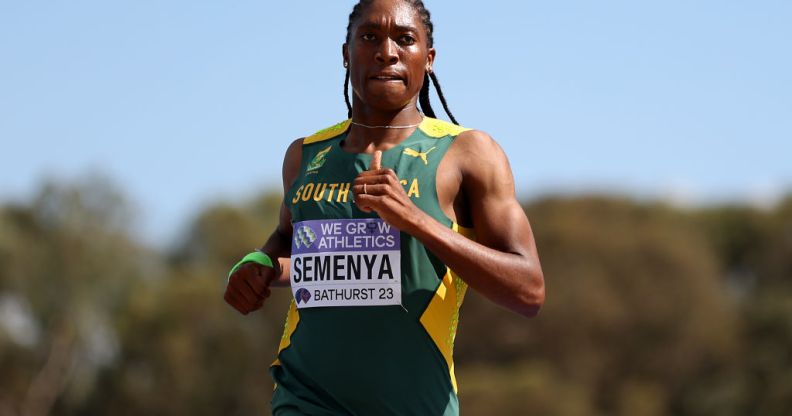Olympian Caster Semenya wins appeal at European Court of Human Rights over testosterone rules

The European Court of Human Rights has ruled in favour of Caster Semenya. (Photo by Cameron Spencer/Getty Images for World Athletics )
Olympic gold medalist Caster Semenya has won an appeal in the European Court of Human Rights in a case involving rules about testosterone levels.
Caster Semenya was essentially blocked from competing when World Athletics introduced rules, which came into effect in 2019, limiting testosterone levels for female athletes — impacting those with differences of sexual development (DSD) — in events of distances between 400m and 1 mile. The rules force certain women to artificially alter their natural hormone levels should they wish to compete.
The court ruled on Tuesday (11 July), with a 4-3 judge majority, that Semenya had been discriminated against, the Associated Press reported.
It also ruled the 32-year-old had been denied an “effective remedy” against discrimination when her two previous appeals against the rules were denied by the Court of Arbitration for Sport and Switzerland’s supreme court.
AP reported the European Court of Human Rights‘ ruling could force the Court of Arbitration for Sport to re-examine the rules. However, it was not clear if the ruling meant these rules would be immediately rolled back, which would allow Semenya to compete at the Paris Olympics next year.
The runner, who competes for South Africa, won the 800 metres track event at both the 2012 and 2016 Olympics.
Why is Caster Semenya fighting World Athletics?
Caster Semenya is classified by World Athletics as having “differences of sexual development” (DSD) and has naturally high testosterone levels.
She was forced between 2010 and 2015 to take medication to suppress her natural hormones. In 2019 she said the treatment left her feeling “constantly sick”, and has since refused to artificially lower her testosterone levels to meet World Athletics’ standards.
In 2018 new rules were introduced with stricter requirements for DSD athletes. Due to the rules targeting only certain events, including those Semenya competes in, World Athletics were accused of singling her out.
After losing a case at the Swiss-based Court of Arbitration for Sport, Semenya lodged an appeal with the Federal Supreme Court of Switzerland
Back in September 2020, when Caster Semenya lost the second of her appeals against the ruling, she was quoted by BBC Sport saying she was “disappointed”.
“I refuse to let World Athletics drug me or stop me from being who I am,” she said.
“Excluding female athletes or endangering our health solely because of our natural abilities puts World Athletics on the wrong side of history.
“I will continue to fight for the human rights of female athletes, both on the track and off the track, until we can all run free the way we were born.
“I know what is right and will do all I can to protect basic human rights, for young girls everywhere.”
World Athletics has made other rule changes around sex and gender, with the governing body announcing earlier in 2023 that it will ban trans women competing in female competitions.
How did this story make you feel?

